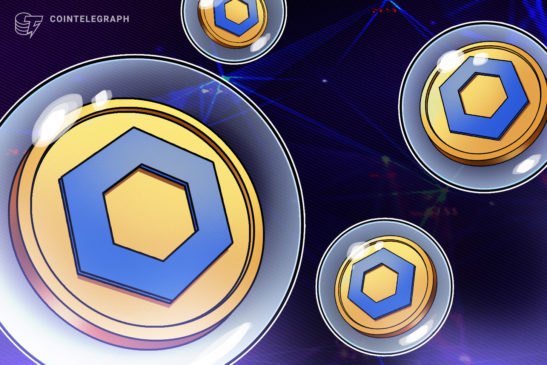On July 13 Chainlink (LINK) rallied more than 34% to reach a new all-time high at $8.48. Since then the price corrected back to the $7 range but at the time of writing the altcoin is making a renewed attempt at taking out the recent all-time high.
LINK has rallied 167% in 2020 and remains one of the top performers in the crypto market but this isn’t the first time it has earned the description. In 2019, the altcoin rallied 1,481% and according to CoinMarketCap, the return-on-investment for those who purchased at the first listed price is now exceeding 5,000%.
Recent data from Santiment, a blockchain analytics firm, found that LINK investors are estimated to be at a 64% profit on average and the cryptocurrency is currently ranked in the number one spot on Santiment’s Emerging Trends list.
Is LINK in a bubble phase?
After such a strong rally from LINK, investors will begin to ask whether or not the asset is in a bubble. Since the Bitcoin price crashed to $3,750 on March 12, a number of altcoins, especially those related to the DeFi market, have rallied into double and triple-digit gains.
LINK’s price action, and that of other cryptocurrencies have some investors convinced that a new alt season has started but it is important to take a closer look at LINK’s fundamentals to see if the rally is driven by FOMO or a combination of more fundamental factors.
CoinMetrics noted that several data points support LINK’s price. For example, total active addresses and the number of transactions have been rising and this indicates that the number of people holding, and more importantly, using LINK has been increasing.
LINK active addresses and number of transactions. Source: CoinMetrics
The number of entities (companies, investors, node operators) getting involved with Chainlink on a deeper level is also increasing. Following Binance’s footsteps, Huobi exchange began running a node in order to provide their price data to the network.
Furthermore, in June, China’s Blockchain Service Network integrated with Chainlink, and is now running 135 nodes.
These nodes (or oracles) are important as they feed information from the outside world into smart contracts which allow for multiple applications within the DeFi space. In order to be an oracle, users must stake a certain amount of LINK which can be lost as a penalty for providing any inaccurate information.
In exchange for their efforts, oracle operators are rewarded with LINK tokens.
Chainlink demand is boosted by DeFi
While Chainlink’s on-chain activity and an increasing number of nodes point to healthy growth in the network, other forces may be at play. For example, there has been growing demand for DeFi-enabled coins like LINK as it provides some of the highest interest for yield farmers cultivating interest on protocols like Aave.
Decentralized Finance protocols can have a big influence over other cryptocurrencies. Take for example, Basic Attention Token (BAT), which from June 19 to July 2 rallied to nearly $0.31 and saw a near-record surge in trading volume as the majority of its circulation supply was locked in Compound. This occurred because the Compound reward mechanism made BAT the most used ERC-20 token in DeFi as COMP tokens were given based on the interest generated on lent BAT tokens.
As the DeFi sector continues to grow, so does the need for reliant and decentralized oracles that can provide outside information to smart contracts. This allows DeFi applications like insurance and gambling to be safer and trustless.
If there is Increased demand for DeFi tokens this could help push LINK price in a more direct way, especially considering that oracles need to stake LINK in order to participate in the network.




